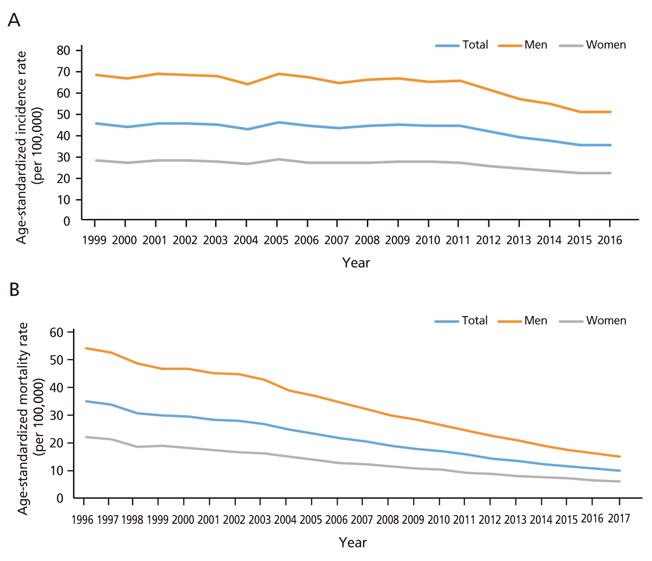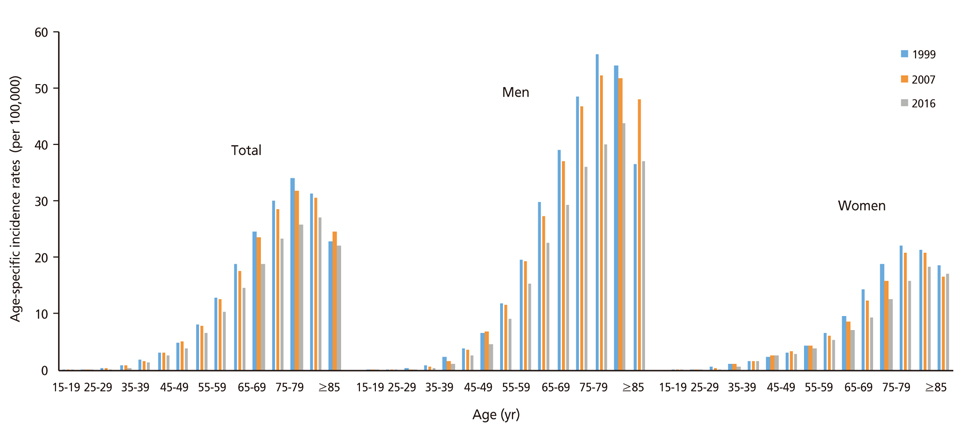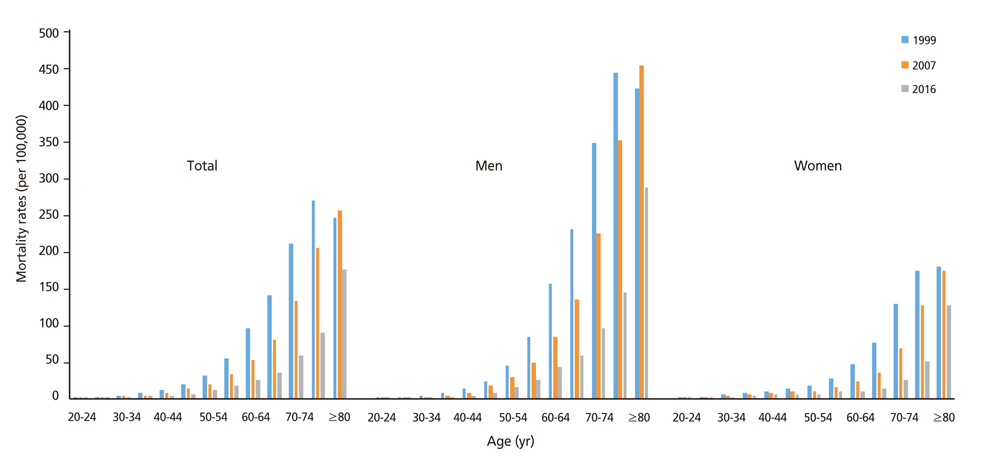J Korean Med Assoc.
2019 Aug;62(8):398-406. 10.5124/jkma.2019.62.8.398.
Epidemiology of gastric cancer in Korea
- Affiliations
-
- 1Department of Preventive Medicine, Gachon University College of Medicine, Incheon, Korea. kpko@gachon.ac.kr
- KMID: 2455376
- DOI: http://doi.org/10.5124/jkma.2019.62.8.398
Abstract
- Rapid aging, economic development, lifestyle westernization, hygiene improvement, and scientific development have contributed for the epidemiologic changes of gastric cancer. This study aimed to review the descriptive epidemiology, risk factors, and prevention of gastric cancer in Korea. Age-standardized incidence and mortality of gastric cancer have decreased and showed age effect and cohort effect. Annual percent change in the incidence of gastric cancer has been prominent in recent years. Major risk factor of gastric cancer is Helicobacter pylori infection. Although H. pylori infection was associated with only non-cardia gastric cancer in meta-analysis, H. pylori infection was associated with both non-cardia and cardia gastric cancer in Asian studies. The estimated population attributable fraction of H. pylori regarding gastric cancer incidence was about 76% in Korean. Cigarette smoking and alcohol drinking was associated with gastric cancer regardless of cardia and non-cardia gastric cancer. Cigarette smoking was estimated to be responsible for 28% of gastric cancer incidence in men and 2% in women. Obesity was risk factor for cardia gastric cancer but not non-cardia gastric cancer. This discrepancy between cardia and non-cardia gastric cancer was consistently shown in epidemiologic studies in Korea. Salt intake was also well-known risk factor of gastric cancer and prevalence of high sodium intake more than 2,000mg in Korean was 81.5%. For primary prevention of gastric cancer, eradication of H. pylori and life-style modification including no smoking, no alcohol drinking, weight control, and low sodium intake are important. Gastric endoscopy is recommended for secondary prevention of gastric cancer.
Keyword
MeSH Terms
-
Aging
Alcohol Drinking
Asian Continental Ancestry Group
Cardia
Cohort Effect
Economic Development
Endoscopy
Epidemiologic Studies
Epidemiology*
Female
Helicobacter pylori
Humans
Hygiene
Incidence
Korea*
Life Style
Male
Mortality
Obesity
Prevalence
Primary Prevention
Risk Factors
Secondary Prevention
Smoke
Smoking
Sodium
Stomach Neoplasms*
Smoke
Sodium
Figure
Cited by 1 articles
-
Population Attributable Fraction of
Helicobacter pylori Infection–Related Gastric Cancer in Korea: A Meta-Analysis
Yoon Park, Moran Ki
Cancer Res Treat. 2021;53(3):744-753. doi: 10.4143/crt.2020.610.
Reference
-
1. Bray F, Ferlay J, Soerjomataram I, Siegel RL, Torre LA, Jemal A. Global cancer statistics 2018: GLOBOCAN estimates of incidence and mortality worldwide for 36 cancers in 185 countries. CA Cancer J Clin. 2018; 68:394–424.
Article2. Korean Statistical Information Service. Health: cancer registration statistics [Internet]. Daejeon: Statistics Korea;cited 2019 Jul 12. Available from: http://kosis.kr/statisticsList/statisticsListIndex.do?menuId=M_01_01&vwcd=MT_ZTITLE&parmTabId=M_01_01.3. National Cancer Information Center. Cancer statistics [Internet]. Goyang: National Cancer Center;cited 2019 Jul 12. Available from: https://www.cancer.go.kr/lay1/S1T639C643/contents.do.4. Cavaleiro-Pinto M, Peleteiro B, Lunet N, Barros H. Helicobacter pylori infection and gastric cardia cancer: systematic review and meta-analysis. Cancer Causes Control. 2011; 22:375–387.
Article5. Bae JM, Kim EH. Helicobacter pylori infection and risk of gastric cancer in Korea: a quantitative systematic review. J Prev Med Public Health. 2016; 49:197–204.
Article6. Shin HR, Shin AK. Attributable cause of cancer in Korea in the year 2009. Goyang: National Cancer Center;2015.7. Ferro A, Morais S, Rota M, Pelucchi C, Bertuccio P, Bonzi R, Galeone C, Zhang ZF, Matsuo K, Ito H, Hu J, Johnson KC, Yu GP, Palli D, Ferraroni M, Muscat J, Malekzadeh R, Ye W, Song H, Zaridze D, Maximovitch D, Aragones N, Castano-Vinyals G, Vioque J, Navarrete-Munoz EM, Pakseresht M, Pourfarzi F, Wolk A, Orsini N, Bellavia A, Hakansson N, Mu L, Pastorino R, Kurtz RC, Derakhshan MH, Lagiou A, Lagiou P, Boffetta P, Boccia S, Negri E, La Vecchia C, Peleteiro B, Lunet N. Tobacco smoking and gastric cancer: meta-analyses of published data versus pooled analyses of individual participant data (StoP Project). Eur J Cancer Prev. 2018; 27:197–204.
Article8. Park S, Jee SH, Shin HR, Park EH, Shin A, Jung KW, Hwang SS, Cha ES, Yun YH, Park SK, Boniol M, Boffetta P. Attributable fraction of tobacco smoking on cancer using population-based nationwide cancer incidence and mortality data in Korea. BMC Cancer. 2014; 14:406.
Article9. Tramacere I, Negri E, Pelucchi C, Bagnardi V, Rota M, Scotti L, Islami F, Corrao G, La Vecchia C, Boffetta P. A meta-analysis on alcohol drinking and gastric cancer risk. Ann Oncol. 2012; 23:28–36.
Article10. Wang PL, Xiao FT, Gong BC, Liu FN. Alcohol drinking and gastric cancer risk: a meta-analysis of observational studies. Oncotarget. 2017; 8:99013–99023.
Article11. Choi YJ, Lee DH, Han KD, Kim HS, Yoon H, Shin CM, Park YS, Kim N. The relationship between drinking alcohol and esophageal, gastric or colorectal cancer: a nationwide population-based cohort study of South Korea. PLoS One. 2017; 12:e0185778.
Article12. Lin XJ, Wang CP, Liu XD, Yan KK, Li S, Bao HH, Zhao LY, Liu X. Body mass index and risk of gastric cancer: a meta-analysis. Jpn J Clin Oncol. 2014; 44:783–791.
Article13. Jee SH, Yun JE, Park EJ, Cho ER, Park IS, Sull JW, Ohrr H, Samet JM. Body mass index and cancer risk in Korean men and women. Int J Cancer. 2008; 123:1892–1896.
Article14. D'Elia L, Rossi G, Ippolito R, Cappuccio FP, Strazzullo P. Habitual salt intake and risk of gastric cancer: a meta-analysis of prospective studies. Clin Nutr. 2012; 31:489–498.15. Woo HD, Park S, Oh K, Kim HJ, Shin HR, Moon HK, Kim J. Diet and cancer risk in the Korean population: a meta-analysis. Asian Pac J Cancer Prev. 2014; 15:8509–8519.
Article16. Kim HJ, Oh K. Methodological issues in estimating sodium intake in the Korea National Health and Nutrition Examination Survey. Epidemiol Health. 2014; 36:e2014033.
Article17. Helicobacter and Cancer Collaborative Group. Gastric cancer and Helicobacter pylori: a combined analysis of 12 case control studies nested within prospective cohorts. Gut. 2001; 49:347–353.18. Sung NY, Choi KS, Park EC, Park K, Lee SY, Lee AK, Choi IJ, Jung KW, Won YJ, Shin HR. Smoking, alcohol and gastric cancer risk in Korean men: the National Health Insurance Corporation Study. Br J Cancer. 2007; 97:700–704.
Article19. International Agency for Research on Cancer. Helicobacter pylori: IARC monographs 100B [Internet]. Lyon: International Agency for Research on Cancer;2012. cited 2019 Jul 12. Available from: https://monographs.iarc.fr/wp-content/uploads/2018/06/mono100B-15.pdf.20. Peek RM Jr, Blaser MJ. Helicobacter pylori and gastrointestinal tract adenocarcinomas. Nat Rev Cancer. 2002; 2:28–37.
Article21. Pormohammad A, Ghotaslou R, Leylabadlo HE, Nasiri MJ, Dabiri H, Hashemi A. Risk of gastric cancer in association with Helicobacter pylori different virulence factors: a systematic review and meta-analysis. Microb Pathog. 2018; 118:214–219.
Article22. Cai H, Ye F, Michel A, Murphy G, Sasazuki S, Taylor PR, Qiao YL, Park SK, Yoo KY, Jee SH, Cho ER, Kim J, Chen SC, Abnet CC, Tsugane S, Cai Q, Shu XO, Zheng W, Pawlita M, Epplein M. Helicobacter pylori blood biomarker for gastric cancer risk in East Asia. Int J Epidemiol. 2016; 45:774–781.
Article23. Kim JH, Kim HY, Kim NY, Kim SW, Kim JG, Kim JJ, Roe IH, Seo JK, Sim JG, Ahn H, Yoon BC, Lee SW, Lee YC, Chung IS, Jung HY, Hong WS, Choi KW. Korea H. pylori Study Group, South Korea. Seroepidemiological study of Helicobacter pylori infection in asymptomatic people in South Korea. J Gastroenterol Hepatol. 2001; 16:969–975.
Article24. Yim JY, Kim N, Choi SH, Kim YS, Cho KR, Kim SS, Seo GS, Kim HU, Baik GH, Sin CS, Cho SH, Oh BH. Seroprevalence of Helicobacter pylori in South Korea. Helicobacter. 2007; 12:333–340.
Article25. Lim SH, Kwon JW, Kim N, Kim GH, Kang JM, Park MJ, Yim JY, Kim HU, Baik GH, Seo GS, Shin JE, Joo YE, Kim JS, Jung HC. Prevalence and risk factors of Helicobacter pylori infection in Korea: nationwide multicenter study over 13 years. BMC Gastroenterol. 2013; 13:104.
Article26. Lee JH, Choi KD, Jung HY, Baik GH, Park JK, Kim SS, Kim BW, Hong SJ, Lim H, Shin CM, Lee SH, Jeon SW, Kim JH, Choi CW, Jung HK, Kim JH, Choi SC, Cho JW, Lee WS, Na SY, Sung JK, Song KH, Chung JW, Yun SC. Korean College of Helicobacter and Upper Gastrointestinal Research. Seroprevalence of Helicobacter pylori in Korea: a multicenter, nationwide study conducted in 2015 and 2016. Helicobacter. 2018; 23:e12463.27. Mirvish SS. Role of N-nitroso compounds (NOC) and N-nitrosation in etiology of gastric, esophageal, nasopharyngeal and bladder cancer and contribution to cancer of known exposures to NOC. Cancer Lett. 1995; 93:17–48.
Article28. Nishino Y, Inoue M, Tsuji I, Wakai K, Nagata C, Mizoue T, Tanaka K, Tsugane S. Research Group for the Development and Evaluation of Cancer Prevention Strategies in Japan. Tobacco smoking and gastric cancer risk: an evaluation based on a systematic review of epidemiologic evidence among the Japanese population. Jpn J Clin Oncol. 2006; 36:800–807.
Article29. World Cancer Research Fund. American Institute for Cancer Research. Diet, nutrition, physical activity and stomach cancer [Internet]. London: World Cancer Research Fund International;2018. cited 2019 Jul 12. Available from: https://www.wcrf.org/sites/default/files/Stomach-cancer-report.pdf.30. Gaddy JA, Radin JN, Loh JT, Zhang F, Washington MK, Peek RM Jr, Algood HM, Cover TL. High dietary salt intake exacerbates Helicobacter pylori-induced gastric carcinogenesis. Infect Immun. 2013; 81:2258–2267.
Article31. Jagerstad M, Skog K. Genotoxicity of heat-processed foods. Mutat Res. 2005; 574:156–172.
Article32. Jeong M, Park JM, Han YM, Park KY, Lee DH, Yoo JH, Cho JY, Hahm KB. Dietary prevention of Helicobacter pylori-associated gastric cancer with kimchi. Oncotarget. 2015; 6:29513–29526.
Article33. Preston DL, Ron E, Tokuoka S, Funamoto S, Nishi N, Soda M, Mabuchi K, Kodama K. Solid cancer incidence in atomic bomb survivors: 1958–1998. Radiat Res. 2007; 168:1–64.
Article34. Henderson TO, Oeffinger KC, Whitton J, Leisenring W, Neglia J, Meadows A, Crotty C, Rubin DT, Diller L, Inskip P, Smith SA, Stovall M, Constine LS, Hammond S, Armstrong GT, Robison LL, Nathan PC. Secondary gastrointestinal cancer in childhood cancer survivors: a cohort study. Ann Intern Med. 2012; 156:757–766.
Article35. Sugano K. Effect of Helicobacter pylori eradication on the incidence of gastric cancer: a systematic review and meta-analysis. Gastric Cancer. 2019; 22:435–445.
Article36. Lee YC, Chiang TH, Chou CK, Tu YK, Liao WC, Wu MS, Graham DY. Association between Helicobacter pylori eradication and gastric cancer incidence: a systematic review and meta-analysis. Gastroenterology. 2016; 150:1113–1124.
Article37. Jun JK, Choi KS, Lee HY, Suh M, Park B, Song SH, Jung KW, Lee CW, Choi IJ, Park EC, Lee D. Effectiveness of the Korean National Cancer Screening Program in Reducing Gastric Cancer Mortality. Gastroenterology. 2017; 152:1319–1328.
Article
- Full Text Links
- Actions
-
Cited
- CITED
-
- Close
- Share
- Similar articles
-
- Gastric Cancer Epidemiology in Korea
- Epidemiology of Intestinal and Diffuse Type of Gastric Cancer: Are Etiologic Factors Common?
- Epidemiology and screening of gastric cancer in Korea
- Surgical Outcomes of Patients Undergoing Gastrectomy for Gastric Cancer: Does the Age Matter?
- Corrigendum: Korean Gastric Cancer Association Nationwide Survey on Gastric Cancer in 2014




